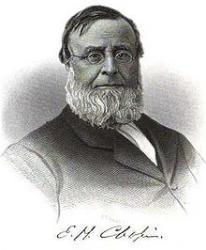Planning worship?
Check out our sister site, ZeteoSearch.org,
for 20+ additional resources related to your search.
- |
User Links
Person Results
William Henry Monk

1823 - 1889 Person Name: Monk Composer of "[Our Father God, not face to face]" in Good-Will Songs William H. Monk (b. Brompton, London, England, 1823; d. London, 1889) is best known for his music editing of Hymns Ancient and Modern (1861, 1868; 1875, and 1889 editions). He also adapted music from plainsong and added accompaniments for Introits for Use Throughout the Year, a book issued with that famous hymnal. Beginning in his teenage years, Monk held a number of musical positions. He became choirmaster at King's College in London in 1847 and was organist and choirmaster at St. Matthias, Stoke Newington, from 1852 to 1889, where he was influenced by the Oxford Movement. At St. Matthias, Monk also began daily choral services with the choir leading the congregation in music chosen according to the church year, including psalms chanted to plainsong. He composed over fifty hymn tunes and edited The Scottish Hymnal (1872 edition) and Wordsworth's Hymns for the Holy Year (1862) as well as the periodical Parish Choir (1840-1851).
Bert Polman
William Henry Monk
Joseph Barnby

1838 - 1896 Composer of "HOREB" in Services for Congregational Worship. The New Hymn and Tune Book Joseph Barnby (b. York, England, 1838; d. London, England, 1896) An accomplished and popular choral director in England, Barnby showed his musical genius early: he was an organist and choirmaster at the age of twelve. He became organist at St. Andrews, Wells Street, London, where he developed an outstanding choral program (at times nicknamed "the Sunday Opera"). Barnby introduced annual performances of J. S. Bach's St. John Passion in St. Anne's, Soho, and directed the first performance in an English church of the St. Matthew Passion. He was also active in regional music festivals, conducted the Royal Choral Society, and composed and edited music (mainly for Novello and Company). In 1892 he was knighted by Queen Victoria. His compositions include many anthems and service music for the Anglican liturgy, as well as 246 hymn tunes (published posthumously in 1897). He edited four hymnals, including The Hymnary (1872) and The Congregational Sunday School Hymnal (1891), and coedited The Cathedral Psalter (1873).
Bert Polman
Joseph Barnby
E. H. Chapin

1814 - 1880 Person Name: Edwin H. Chapin Author of "Our Father God, not face to face" in Good-Will Songs Chapin, Edwin Hubbell, D.D., was the most distinguished man of the Universalists in later years. In his early days he was eminent as a lecturer; and as a preacher until his death. He was born in Union village, Washington, N. Y., Dec. 29, 1814, and educated at Bennington, Vermont. He was successively pastor at Richmond, Virginia, 1837; Charleston, Mass.; Boston, 1846; and from 1848, of the Church of the Divine Paternity, New York city. He died Dec. 26, 1880. He published several works, and edited, with J. G. Adams, Hymns for Christian Devotion, Boston, 1846. This is perhaps the most prominent Universalist Collection in the States. To it Dr. Chapin contributed the following hymns:—
1. Amid surrounding gloom and waste. During a Storm.
2. Father, at this altar bending. Installation of a Pastor.
3. Father, lo, we consecrate. Opening of a Place of Worship.
4. Hark! hark! with harps of gold. Christmas.
5. O Thou who didst ordain the word. Ordination.
6. Our Father, God! not face to face. Opening of a Place of Worship.
7. When long the soul has slept in chains. Charitable Institutions.
Of these No. 6 is the most widely used. In addition Dr. Chapin is the author of:—
8. Now host with host assembling. Temperance. This was given in Longfellow and Johnson's Book of Hymns (Unitarian), 1848, and from thence has passed Into other collections. It is entitled "Triumph of Temperance." and is well known. [Rev. F. M. Bird, M.A.]
--John Julian, Dictionary of Hymnology (1907)
E. H. Chapin


 My Starred Hymns
My Starred Hymns


